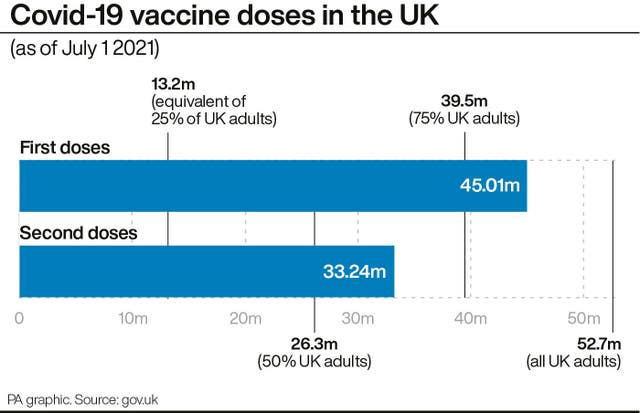England primed to ‘return to normality’ on July 19 with restrictions rolled back
Life will “return to normality as far as possible” after July 19 in England as the country moves into the “final furlong” of coronavirus restrictions, a senior Government minister has said.
Rumours were abound in the Sunday newspapers that Boris Johnson, who is due to update the nation this week on plans for unlocking, is due to scrap social distancing and mask-wearing requirements on so-called “Freedom Day”.
Communities Secretary appeared to all but confirm those reports as he said the impact of the vaccine on preventing serious illness meant it was time to “roll back” the “difficult” restrictions that have been in place for the past 16 months.
Robert Jenrick told the BBC’s Andrew Marr Show: “It does look as if, thanks to the success of the vaccine programme, that we now have the scope to roll back those restrictions and return to normality as far as possible.”

According to The Sunday Times, mask wearing will become voluntary in all settings and the one metre-plus rule in hospitality venues will end, meaning a return to drinking at the bar without the requirement for table service.
Mass events, including festivals, will also be allowed under the proposals for the final stage of the road map out of lockdown, the paper said.
Cabinet minister Mr Jenrick said that, although cases were rising, they had not translated into “serious illness and death”, allowing the Government to be “positive” about unlocking on July 19.
“It does feel as if we are now in the final furlong, in a period in which we can start to live with the virus and move on with our lives,” he said.
Mr Jenrick said the “State won’t be telling you what to do” as ministers look to move from legal enforcement to personal choice, with people exercising their own judgment on whether or not to carry on wearing masks.
The onus instead will be on ensuring that “every adult gets fully vaccinated” to guard against rising hospital admissions and deaths, he told the Sky News programme Trevor Phillips On Sunday.
Professor Stephen Powis, national medical director of NHS England, backed up the minister’s assessment of the impact vaccines were having on guarding against the virus.
He told Marr that Public Health England had found vaccines were affording “over 90% protection against severe disease”, in a result that meant fewer sufferers were requiring hospital treatment.
“So the link is not totally broken, but it’s severely weakened,” Prof Powis added, as he urged the public to keep up the habits adopted during the pandemic, such as washing hands more frequently and not going into work if feeling unwell.
He also said it would “not necessarily (be) a bad thing” if people continued to wear masks in crowded spaces as “those habits to reduce infections are a good thing to keep”.
A Government adviser said that if early preparations for the winter, such as deploying a booster vaccination programme, were put in place, then he would be “cautiously optimistic” that the lifting of restrictions this month could prove irreversible, despite fears of measures returning in the colder months.
Dr Mike Tildesley, a member of the Scientific Pandemic Influenza Group on Modelling (SPI-M) – which provides evidence to the Scientific Advisory Group for Emergencies – told BBC Breakfast: “Hopefully we’ll be well prepared moving forward and we won’t need any sort of restrictions to be put in place as we move into the autumn and winter.”
He added: “I hope when we move into the autumn we can start to have a little bit more of what I call the flu relationship with Covid.”
The possibility of a wholesale easing of restrictions will come as a blow to senior doctors, with the British Medical Association petitioning for some measures to remain in place to arrest the “alarming” rise in Covid-19 cases in England.
The latest Government figures show that, as of 9am on Saturday, there had been a further 24,885 lab-confirmed Covid-19 cases in the UK, while a further 18 people had died within 28 days of testing positive.
It comes after the Office for National Statistics (ONS) found that cases in England nearly doubled in a week, with one in 260 people in private households having Covid in the week to June 26 – the highest level since the week to February 27.
Meanwhile, the Communities Secretary said he hoped the UK could “move as one” when lifting pandemic restrictions but acknowledged the picture was different across the Union.
Last week saw the most coronavirus cases than at any point in Scotland during the pandemic, with a peak of 4,484 new infections recorded.
“We are going to work with Scotland, Wales and Northern Ireland to try and be as co-ordinated as possible,” Mr Jenrick told the BBC.
“Cases are slightly different in each of the four nations but certainly in England, our view is that things are looking positive for July 19.”


